#Matthew 11:30
Photo

Matthew 11:30 (NLT) -
For My yoke is easy to bear, and the burden I give you is light.”
50 notes
·
View notes
Text
Music For the Soul
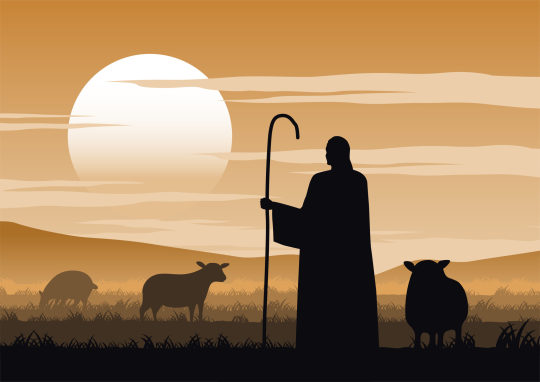
by Alexander MacLaren
The Rule of Christ
My yoke is easy, and My burden is light
- Matthew 11:30
If you want to rule yourselves let Christ rule you. Put your trust in Him; leave yourself in His hand; lay yourselves at His feet; rest upon His great sacrifice; look to Him for forgiveness; and then look to Him for marching orders, and for pure living, and for everything else. He will give power to your will, however feeble it was before, and susceptibility to your conscience that it never had when it was case-hardened by your love of evil, and you will be able to subdue the passions which would sweep you away and would laugh at all other control. Put the reins into His hands, and He will bridle and tame your wild desires. Submit to Him, and He will make you "lord of yourself, though not of lands " - man’s noblest kingship.
We are like some of those little Rajahs whose states adjoin our British possessions, who have trouble and difficulty with revolted subjects, and fall back upon the great neighbouring power, saying: "Come and help me; subdue my people for me, and I will put the territory into your hands." Go to Christ and say: "Lord! they have rebelled against me! These passions, these lusts, these follies, these weaknesses, these sinful habits of mine, they have rebelled against me! What am I to do with them? Do Thou come and bring peace into the land, and Thine shall be the authority." And He will come and loose you from your sins, and make you kings.
And there is another realm over which we may rule; and that is, this bewitching and bewildering world of time and sense, with its phantasmagoria and its illusions and its lies, that draw us away from the real life and truth and blessedness. Do not let the world master you! It will, unless you have put yourself under Christ’s control. He will make you king over all outward things, by enabling you to despise them in comparison with the sweetness which you find in Him, and so to get the highest good out of them. He will make you their lord by helping you to use all the things seen and temporal as means to reach a fuller possession of the things unseen and eternal. Their noblest use is to be the ladder by which we climb to reach the treasures which are above. They are meant to be symbols of the eternal, like painted windows through which our eye may travel to the light beyond, which gives them all their brilliancy. He rules the waves who, with a strong hand on the tiller, makes the currents serve to bear his barque to the harbor. And he rules outward things who bends and coerces them to be the servants of his spirit in its highest aspirations, and so turns them to their noblest use.
7 notes
·
View notes
Text
Albert Barnes [1798-1870] | Matthew 11:29-30
Take MY yoke—This is a figure taken from the use
of oxen, & hence signifying to labor for one, or in
the service of anyone.
The “yoke” is used in the Bible as an emblem:
[1] of bondage or slavery, Le 26:13; De 28:38.
[2] of afflictions or crosses, Lamentations 3:27.
[3] of the punishment of sin, La 1:14,
[4] of the commandments of GOD.
[5] of legal ceremonies, Acts 15:10; Ga 5:1.
• Leviticus 26:13 [Berean] ¹³ I am the LORD your
GOD, who brought you out of the land of Egypt,
you would no longer be slaves to the Egyptians.
I broke the bars of your yoke & enabled you to
walk in uprightness.
• Deuteronomy 28:38 | ³⁸ You will sow much seed
in the field but harvest little, because the locusts
will consume it.
• Lamentations 3:27 [Berean] ²⁷ It is good for a man
to bear the yoke while he is still young.
• Lamentations 1:14 [Berean] ¹⁴ My transgressions
are bound into a yoke, knit together by His hand;
they have come upon my neck, and the LORD has
broken my strength. HE delivered me into the
hands of those I cannot withstand.
• Acts 15:10 [Berean] ¹⁰ Now then, why do you test
GOD by placing on necks of the Disciples a yoke
that neither we nor our fathers have been able
to bear?
• Galatians 5:1 | ¹ It is for freedom that CHRIST has
set us free. Stand firm, then don't be encumbered
once more by a yoke of slavery.
It refers here to the religion of the Redeemer; & the idea
is, that they should embrace HIS system of religion and
obey HIM.
All virtue & all religion imply “restraint”—the restraint of
our bad passions & inclinations, & subjection to laws; &
the SAVIOUR here means to say the restraints & laws
of HIS religion are mild, & gentle, & easy.
Let anyone compare them with the burdensome &
expensive ceremonies of the Jews [see Acts 15:10],
or with the religious rites of the pagan everywhere,
or with the requirements of the Popish system, and
he will see how true it is that JESUS' yoke is easy.
And let HIS laws & requirements be compared with
the laws which sin imposes on its votaries—the laws
of fashion, & honor, & sensuality—& he will feel that
religion is “freedom,” John 8:36.
“HE is a freeman whom the truth makes free, & all
are slaves besides.” It is “easier” to be a Christian
than a sinner; & of all the yokes ever imposed
on people, that of the Redeemer is the lightest.
For I am meek …—See the notes at Matthew 5:5.
This was eminently CHRIST's personal character.
But this is not its meaning here.
HE is giving a reason why they
should embrace HIS religion.
That HE was not harsh, overbearing, & oppressive,
like the Pharisees, but meek, mild, & gentle in HIS
government. HIS laws were reasonable & tender, &
it would be easy to obey HIM.
youtube
The Slavery of Freedom | John Mark Comer [Galatians 6]
Fighting World, Flesh, & Devil P2
Please turn to Galatians 6, as we continue our fall
practice on fighting the world, the flesh, & devil.
Last time we kicked off module 2 on the flesh, in
case you missed it—I don't have time to recap all
of that content.
We have a lot of ground to cover; go back if you
are up for it—listen to the podcast short version
We define the flesh as the base animalistic primal
drive in all of us, for self-gratification. Put another
way—it's the part of our heart bent from GOD and
from HIS definition of good & beautiful & true.
And is instead in the language of the 4th century
African theologian Augustine, turned in on itself
Calling out this corner of our heart is just naming
an aspect of the human condition we all have to
fight.
As a follower of JESUS or not:
this inner tug-of-war between our mixed
desires: some of which are good & healthy
—others of which are the exact opposite,
but the way of JESUS is not a new idea &
so no Christian idea but the way of JESUS
has a unique contribution to make
Because it's a solution to the problem of what we
call the flesh—is not willpower, but is the spirit's
power.
All of which, leads us to Galatians 6.
This week's teaching is essentially part 2 of a very
long teaching—that we started from Galatians 5-6
—which is one of the go to passages in the NT for
a biblical theology of the flesh & the SPIRIT.
We left off last time, if you were here, at the end
of CH 5—with this idea that the West, in general,
has radically redefined the idea of freedom.
Often what we call freedom, we mean is the ability
to do whatever the heck we want—which is actually
what JESUS & Paul & the writers the NT define as
slavery because when we give in to our flesh
the part of our heart that has bent away
we end up enslaved, by our own desires
in particular to sin.
Now for tonight let's keep reading from where we
left off at the end of CH 5. Let's start off in 6:1-9
#Matthew 11#Matthew 11:29#Matthew 11:29-30#Matthew 11:30#easy yoke#embrace JESUS#embrace HIS religion#truth makes free#freedom#gentle#mild#HIS yoke is easy#reasonable#tender#easy to obey HIM#Barnes#Slavery of Freedom#Galatians 6
1 note
·
View note
Video
youtube
Take My Yoke Upon You | 30 Minutes of Of Prayer Worship Acoustic Emotion...
#youtube#take my yoke upon you#JesusIsLord#bible scripture#prayer#worship the lord#Worship Acoustic Emotion#foggy forest#pine trees#rain#Fog#Matthew 11:28#Matthew 11#Matthew 11:29#Matthew 11:30#matthew 11:28-29#Matthew 11:28-30
0 notes
Text
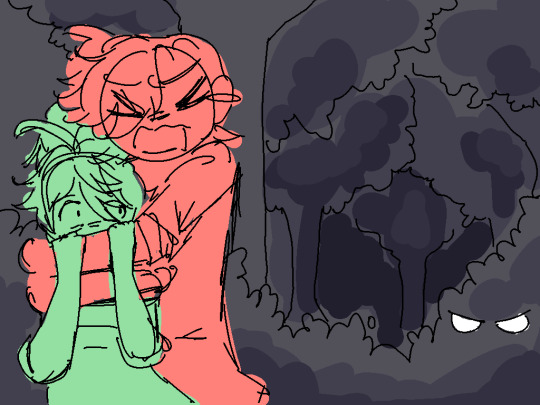
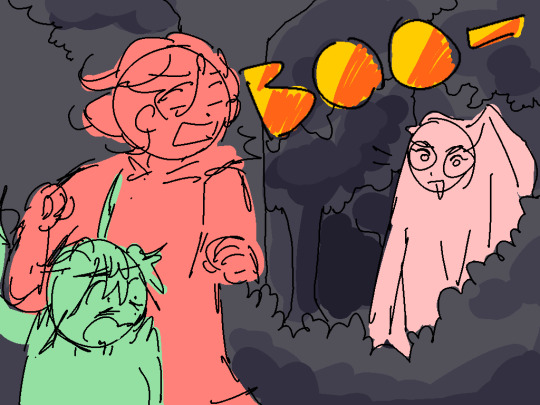
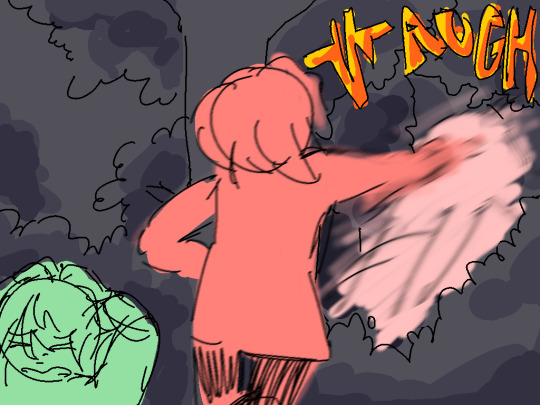

drdttober day sixteen - supernatural
#this is.. late :(#drdt#danganronpa despair time#drdttober2023#drdttober 2023#teruko tawaki#xander matthews#whit young#OK I AM SO SORRY THAT THIS IS LATE#it has been my like number one goal to do this each day even if it’s like. 11 p#m#but night before last i was up until 4 am doing an assignment#and yesterday i was like. very tired. i did some work but at like 5:30 i was like. i need a 30 min power nap#so i went to sleep and um. suddenly it’s 6 am and i have to leave#i am very sorry i will be posting twice today
38 notes
·
View notes
Text

Matthew 11:28-30 (NASB1995). “Come to Me, all who are weary and heavy-laden, and I will give you rest. Take My yoke upon you and learn from Me, for I am gentle and humble in heart, and you will find rest for your souls. For My yoke is easy and My burden is light.”
“The Beauty of the Yoke” By In Touch Ministries:
“The difficulties of this life are opportunities to walk closely with our Savior and know Him better.”
“Jesus invites all burdened individuals to come to Him for rest, yet so often we misunderstand what He is asking of us. We can’t just dump our problems on the Lord and walk away unchanged. Using an agricultural image, He asks us to join Him in the “yoke” so we can walk and work together. In other words, He doesn’t want just our burdens; He wants us!
The yoke of Christ is a symbol of discipleship, characterized by submission and obedience to Him. God’s goal isn’t simply to remove a weighty trial or affliction; He longs to draw us to Himself in a close and trusting relationship. Remember, the “yoke is comfortable” and the “burden is light” when our Savior is helping us bear it (v. 30). That’s why those who take Him up on His offer will experience an amazing transformation.
The process of sharing the load begins with learning to know and understand the Lord. The burden is not necessarily removed, but the weight of the affliction shifts from our shoulders to His. Life’s pressures may not lessen, but if we are intimately linked with Jesus, our soul will be free from anxiety, and His peace will rule in our heart.”
#matthew 11:28-30#bible verses#rest in jesus#bible truths#bible scriptures#bible quotes#bible study#christian devotionals#daily devotions#bible#christian blog#god#belief in god#faith in god#jesus#belief in jesus#faith in jesus#christian life#christian living#christian faith#christian inspiration#christian encouragement#christian motivation#christianity#christian quotes#in touch ministries#keep the faith#make him known#bible scripture#biblequotes
17 notes
·
View notes
Text
Narrative Lectionary: God's Love Poured Out
Romans [3:28-28-30] 5:1-11Matthew 11:28-30
Call to WorshipGod welcomes all of us into God’s armsCome let us rest with GodGod comforts us and eases our burdensGod calls us homeCome let us worship GodCome let us worship God
Call to Confession: God calls us all to confess our faith, for faith is enough, come let us confess ourselves to God
God we confess that sometimes we do not feel like we are…
View On WordPress
2 notes
·
View notes
Text

#Sermon:.#THE TRANSFORMING POSSIBILITIES OF THE TRANSFIGURATION OF JESUS#Matthew 17:1-8; 2 Peter 1:16-18#SUBTOPIC#1. THE MAJESTY AND GLORY OF THE TRANSFIGURED CHRIST#2. THE MESSAGE FROM GLORY FOR ALL TEACHABLE CREATURES#3. THE MIRACLE OF GLORY THROUGH HIS TRANSFORMING CROSS#Matthew 17:1-3; Luke 9:28-31#3 things to consider#i. The marvel and the greatness of His transfiguration#ii. The meaning and goodness in our transformation#iii. His mission of grace for our transfusion#i. The marvel and the greatness of His transfiguration_Matthew 17:1#2; 2 Peter 1:16-18; 2 Corinthians 4:6; Hebrews 2:9-11#ii. The meaning and goodness in our transformation_Luke 9:28#29; Psalm 51:7-10; Ephesians 5:26#27; Revelation 7:9-14#iii. His mission of Grace for our Transfusion_Luke 9:30-31; Hebrews 2:9#14-15; Titus 2:11-14; 1 Peter 1:10-12#Mark 9:3-7; 2 Peter 1:17#18#i. The father's message from heaven#ii. The full message for all humans. iii. The final message for all to hear#i. The Father’s message from heaven_Matthew 17:5#6; Deuteronomy 18:15#19; Acts 3:22-26; Hebrews 1:1-3#ii. The full message for all humans_Mark 9:7#8; Hebrews 2:1-3; 12:25#26; John 12:49#50
2 notes
·
View notes
Text
Pray As If Your Relationship With God Depends on It
When you pray, do you sometimes mail it in? Just throw up the quick request and fall asleep? When it comes to praying, do you ever wonder if it matters, or if it is even necessary? Then here’s some food for thought…
The Lifeline
“Jesus said, “When you have seen me, you have seen the Father”, and “I and my Father are one.” (John 10:30; 14:9) You might suppose that, as the Son of God, Jesus had…
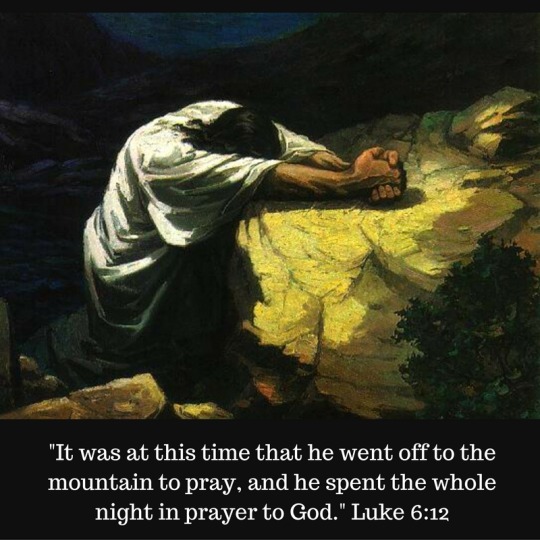
View On WordPress
#Jesus#John 10: 30#John 11:41-42#John 14:9#Luke 5:16#Luke 6:12#Mark 1:35#Mark 6:46#Matthew 14:23#Matthew 6:9#pray
0 notes
Text
Come to me, all you who are weary and burdened, and I will give you rest
Daily Gospel Reading – Matthew 11:28-30
28 “Come to me, all you who are weary and burdened, and I will give you rest. 29 Take my yoke upon you and learn from me, for I am gentle and humble in heart, and you will find rest for your souls. 30 For my yoke is easy and my burden is light.”
New International Version (NIV)Holy Bible, New International Version®, NIV® Copyright ©1973, 1978, 1984, 2011…

View On WordPress
0 notes
Photo
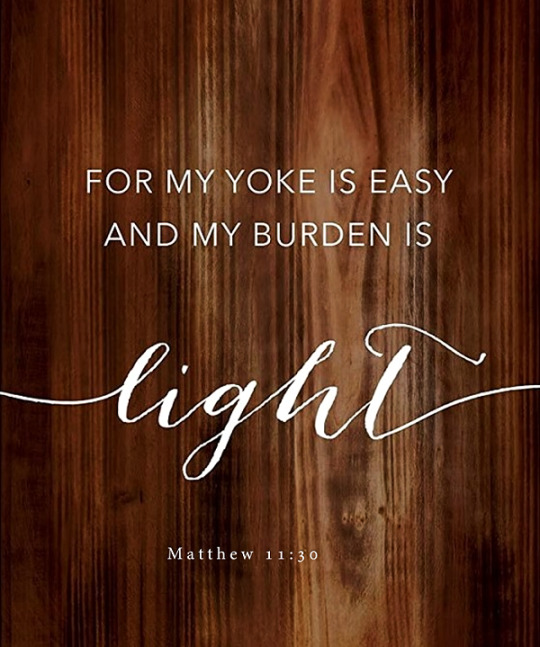
Matthew 11:30 (NKJV) -
For My yoke is easy and My burden is light.”
79 notes
·
View notes
Text
Devotional Hours Within the Bible
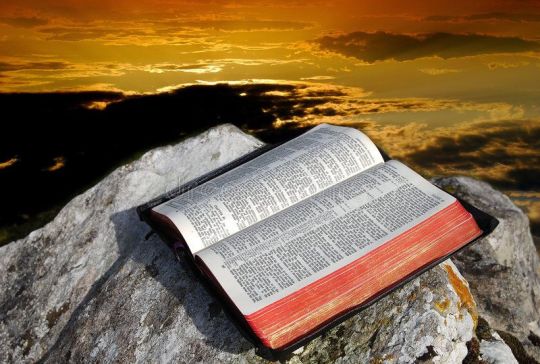
by J.R. Miller
Warning and Invitation (Matthew 11:20-30)
“Then Jesus began to denounce the cities in which most of his miracles had been performed, because they did not repent.”
- Matthew 11:20
It seems strange to hear Jesus upbraiding. His words usually were most gracious and loving. Here, however, we hear Him speaking in tones of sharpness and severity. Yet the phase of His character which is now revealed is not inconsistent with other representations of Him in the Gospels. We must not think of Jesus as having no capacity for anger. He was all love but love can be severe, even dreadful. While He was a friend of sinners and went to His cross to redeem the ungodly yet He hated sin. He was just and holy.
We should notice carefully, however, the reason for this upbraiding. It fell upon the cities in which Jesus had done most of His mighty works. These were not His first words to the people of these cities. There had been long months of loving ministry, with miracles of mercy, with words of grace, revealings of the Father-heart of God, and offers of eternal life before He spoke the words of chiding we now hear Him speak. But the people of these favored cities had been unaffected by all this love. They had gone on in their sins, unrepentant. They had accepted Christ’s gifts of love but had not accepted Him as their Lord. They had taken His help, His kindness, the things He had done for them so lavishly but they had rejected Him .
The upbraiding of these cities was because after all that he had done for them, after all their spiritual opportunities and privileges, they had rejected Jesus. It was not impatience on His part that made Him severe. He had not grown weary loving, even without return. But the fact that the cities had received so much Divine favor, made their sin in rejecting Christ far greater.
Tyre and Sidon, great commercial cities which had been denounced by the prophets for their sins, would have repented, Jesus said if such Divine blessings as had been shown to Chorazin and Bethsaida had been given to them. Sodom was the great historical example of wickedness in the history of the world, and its destruction was a notable instance of judgment. But even Sodom would have repented, if it had received such calls and had enjoyed such privileges as had Capernaum. And Sodom’s judgment would be more tolerable than that of Capernaum.
There is something startling in what Jesus says here about the doom of these Galilean cities, and the reason for it. They had had high privileges, and had disregarded them. What then about the places in our own day which have had exceptional privileges and have not improved them? What about those who have been brought up in Christian homes, amid the most gracious influences, who have seen Christ continually and have known the beautiful things of His love from infancy and after all have kept their hearts closed upon Him, refusing His love! The question with which we are really personally concerned is not with Chorazin or Capernaum, but ourselves, our privileges and what we are doing with them.
“More tolerable.” So we would better have been born and brought up in some heathen land, never hearing of Christ than to have had the highest Christian privileges, and then to have turned our back on the Savior of men. We may perish with Christ at our door. Christian privileges will not save us. The question after all is, “What are you doing with Christ?”
The other part of our passage is in a different tone. Here we find mercy again in its most gracious mood. The invitation in the closing verses is better understood when we have studied the great words that precede it. “All things have been committed to me by my Father,” said Jesus. All things had been put into His hands, all power, all mercy, all gifts, all life. This ought to be a great comfort to us, amid this world’s mysteries and perplexities, when there are things which threaten to destroy us. It is Jesus Christ, the Christ of the gospel, in whose nail-marked hands are all our affairs.
There can be no revealing of the Father, except as Jesus Christ wills to reveal Him. It is very important then to learn how He dispenses the revelation which is in His hand exclusively. Will He impart it only to a few great saints, to a little company of wise men, to certain rare spirits? The answer is in the gracious invitation which follows, “Come unto Me, all who that labor and are heavy laden, and I will give you rest.” Yet there is a distinct class of people to whom the gracious invitation is especially given, “all who that labor and are heavy laden.” This does not mean the rich, the noble of birth, the high of rank, the wise the great among men. It includes the lowly, the oppressed, the over burdened, the weary, those who are in distress. Need is the only condition. There is no one anywhere who desires the blessings of love, of mercy, of grace, to whom this wonderful invitation is not given and who may not claim it and accept it with all confidence.
Perhaps no other of Christ’s words has given comfort to more people, than this promise of rest. It meets every heart’s deepest longing. What is this rest? It is not cessation from work. Work is part of the constitution of human life. It is necessary to health, to happiness, even to existence. God works. “My Father works,” said Jesus, “and I work” (see John 5:17). There is a curse on idleness.
It is rest of soul that Jesus promises. The life is at unrest. It is all jangled and can have no rest until it is brought into harmony. Sin is the cause of this universal human unrest, and rest can come only when forgiveness has come. And this is the first rest that is promised. Everyone who comes to Christ is forgiven.
There are two rests promised. “I will give you rest.” This rest comes at once. Every weary one who comes to Christ in penitence and with repentance is forgiven, reconciled and restored to Divine favor.
Then there is a rest which comes later and only through self-discipline and patient learning. “Take My yoke upon you, and learn of Me… and you shall find rest.” To take Christ’s yoke on us is to take Him as our Master, to let Him rule our life. The thought of a yoke is suggestive of bondage and humiliation. But the yoke of Christ is nothing galling or dishonoring in it. “My yoke is easy,” He says. He is a gentle taskmaster. He requires entire submission to His will. He will not share our subjection with any other master. We must take His yoke upon us willingly, cheerfully, without reserve. But His commandments are not grievous, His burden is light. Then we will find honor and blessing in it.
A yoke implies two united, serving together, walking side by side under the same load. It is Christ’s yoke we are to bear, which means that He shares it with us. His shoulder is under every load of ours. If we have a sorrow it is His, too. In all our afflictions He is afflicted. Thus it becomes a joy to take Christ’s yoke. When He is our Master, we are free from all other masters. In bearing His yoke, we will find rest unto our souls. Our lives under His sway will be at peace.
Another step in finding rest is to enter Christ’s school. “ Learn of Me,” said the Master. We are only beginners when we first become Christians. A good man said, ‘It takes a long time to learn to be kind it takes a whole lifetime.” He was right it does take as many years as one lives, to learn the one little lesson of kindness. Paul said, and said it when he was well on in life, “I have learned in whatever state I am, therewith to be content” (Philippians 4:11). We would suppose that such a wonderful man as Paul was, did not have to learn the lesson of contentment. We can scarcely think of him as ever fretting about his condition and circumstances. But evidently he did, and it was a long, difficult lesson for him to learn to be content anywhere, in any and every experience. Even Jesus Himself had to learn life’s lessons. In the Epistle to the Hebrews it is said that He learned obedience by the things that He suffered (see Hebrews 5:7, Hebrews 5:8).
All of Christian life is a school. We enter it when we first come to Christ. We begin at the lowest grade. We do not have to wait until we know a great deal before we begin to attend school. School is not for finished scholars but for the most ignorant. We may come to Christ when we know almost nothing. He is a teacher and He wants us to become learners. Gentleness is a lesson which we are to learn. One young girl said, “I never can get over being jealous. I cannot bear to have my friends love anybody else. I want them to love only me.” But she must learn the lesson of generosity in friendship. She must learn to want her friends to love others. It probably will take her a good while, the lesson will be a long one but she must learn it because it is in Christ’s curriculum for all His students, and no one can get His certificate of graduation without learning it.
Patience is a lesson that has to be learned. An impatient person is not a complete Christian. Thoughtfulness is another necessary lesson. There are a great many thoughtless Christians. The poet tells us that evil is wrought by lack of thought as well as lack of heart. Many people are always blundering in their relationship and fellowship with others. They say the wrong word, they do the wrong thing. They leave undone the things they ought to have done. They are always hurting other people’s feelings, giving pain to gentle hearts. Yet it is all from thoughtlessness. “I didn’t mean to offend him. I didn’t mean to be unkind. I just never thought .” There are few lessons in Christian life that more people need to learn than this of thoughtfulness.
We have to learn to trust. Worry is a sin. It is probably as great a sin as dishonesty or profanity or bad temper. Yet a good many Christian people worry at first, and one of the most important lessons in Christ’s school, is to learn not to worry. Joy is a lesson to be learned. Peace is another. Humility is another. Praise is a great lesson. All of life is a school, and it is in learning these lessons that Jesus says we shall find rest for your souls. Christ Himself is our teacher, and with Him we should never fail to learn, though it be only slowly. Then as we learn, our lives will grow continually more and more into quietness, peace and Christlikeness. All our questions will be in the faith that accepts God’s will as holy and good even when it is hardest.
#Devotional Hours Within the Bible#James Russell Miller#Warning and Invitation#Matthew 11:20-30#December 20#2022
11 notes
·
View notes
Text
Geneva: Coverdale & Knox [1557] | Matthew 11:29-30
Take MY yoke upon you, & learn of ME;
for I am meek & lowly in heart:
& you all shall find rest unto your souls.
Matthew Poole [1624-1679] | Matthew 11:28-30
Our LORD having before showed;
1. That all power was given to HIM;
2. That none could know the FATHER but by & in HIM;
closes HIS discourse with an invitation of persons to
HIM. By the weary & heavy laden, in the text, some
understand those who are laden with the sense of
their sins, & the feeling the guilt of them.
Others understand, with the burden of the law, which
the Apostles called a yoke, Acts 15:10.
• Acts 15:10 [Berean] ¹⁰ Now then, why do you test
GOD by placing on the necks of Disciples a yoke
that neither we nor our fathers have been able
to bear?
Matthew Henry [1662-1714] | Matthew 11:29-30
11:25-30 It becomes children to be grateful.
When we come to GOD as a FATHER -- we must
remember HE is LORD of Heaven & Earth, which
obliges us to come to HIM with reverence as to
the sovereign LORD of all;
yet with confidence, as one able to defend us
from evil, & to supply us with all good.[l]
Blessed LORD added a remarkable declaration,
that the FATHER had delivered into HIS hands
all power, authority, & judgment.
[j]are indebted to CHRIST for all the revelation
we have of GOD the FATHER's will & love, ever
since Adam sinned.
Our SAVIOUR has invited all that labour
and are heavy-laden, to come unto HIM.
In some senses all men are so.
Worldly men burden themselves with
fruitless cares for wealth & honours;
the gay & the sensual labour
in pursuit of pleasures;
the slave of Satan & his own lusts, is the
merest drudge on Earth.
Those who labour to establish their own
righteousness -- also labour in vain.
The convinced sinner is heavy-laden with guilt
& terror; & the tempted & afflicted believer has
labours & burdens.
CHRIST invites all to come to HIM for rest to their
souls. HE alone gives this invitation; men come to
HIM when feeling their guilt/misery, & believing
HIS love and power to help.
They seek HIM in fervent prayer.
Thus it is the duty and interest of weary and
heavy-laden sinners, to come to JESUS CHRIST.
This is the Gospel call; whoever will, let HIM come.
All who thus come will receive rest as CHRIST's
gift, & obtain peace & comfort in their hearts.
But in coming to him they must take his yoke,
& submit to his authority. They must learn of
all things, as to their comfort & obedience.
HE accepts the willing servant, however imperfect
the services. Here we may find rest for our souls, &
here only.
Nor need we fear HIS yoke.
HIS commandments are Holy, just, & good.
******************************************************
It requires self-denial, & exposes to difficulties,
but this is abundantly repaid, even in this world,
by inward peace & joy.
******************************************************
It is a yoke that is lined with love.
So powerful are the assistances HE gives us, so
suitable the encouragements, & so strong the
consolations to be found in the way of duty,
we may truly say, it is a yoke of pleasantness.
The way of duty is the way of rest.
The truths CHRIST teaches are such as we may
venture our souls upon.
Such is the Redeemer's mercy; and why should the
labouring & burdened sinner seek for rest from any
other quarter?
Let us come to HIM daily, for deliverance from
wrath & guilt, from sin and Satan, from all our
cares, fears, & sorrows.
*******************************************************
But forced obedience, far from being easy & light,
is a heavy burden. In vain do we draw near to JESUS
with our lips, while the heart is far from HIM.
*******************************************************
Then come to JESUS to find rest for your souls.
Johann Bengel, Lutheran [1734] | Matthew 11:29-30
Matthew 11:29. Ἄρατε, take ye—To take the yoke of
CHRIST upon us— is to give oneself up wholly to HIS
discipline—ὅτι, κ.τ.λ., because, etc.
Hence it appears why we should willingly learn from
JESUS.[l]meekness & lowliness are consequent upon
our so doing—πρᾶός εἰμι καὶ ταπεινὸς, κ.τ.λ., I am
meek & lowly, etc] Although HIS language is fearful
in Matthew 11:20; Matthew 11:24.
• Matthew 11:20 [Berean] ²⁰ Then JESUS began to
denounce cities in which most of HIS miracles
had been performed, bcthey did not repent.
• Matthew 11:24 [Berean] ²⁴ But I tell you that it
will be more bearable for Sodom on the day
of judgment than for you.”
- Meekness produces easiness of yoke;
- lowliness of heart, lightness of burden.
The Pharisees were austere & proud.
Condescension [Demissio] is a much to be admired
virtue of GOD, which is described as fully as possible
--although it is not named in Scripture, by one word;
whose likeness, humility, is found in the saints;
whose opposite, pride, in Satan & the wicked.
For it is condescension, that the highest Majesty
should have deigned at all to make creatures, &
especially men, however contemptible, however
mean, & to look on them without disdain, and to
unite them to ITSELF.
And the SON of GOD in a most conspicuous manner
manifested HIS humility in our flesh—Psalm 34:7;
Ps 113:6; Lk 1:48; 1:52-53; 12:37; 22:27; John 12:26;
13:14; Ph 2:8; Hebrews 11:16—τῇ καρδίᾳ, in heart]
• Psalm 34:7 [Berean] ⁷ The Angel of the LORD
encamps around those who fear HIM, & HE
delivers them.
• Psalm 113:6 [Berean] ⁶ HE humbles HIMSELF
to behold the Heavens and the Earth.
• Luke 1:48 | ⁴⁸ For HE has looked with favor on
the humble state of HIS servant. From now on
all generations will call me blessed.
• Luke 1:52-53 [Berean] ⁵² He has brought down
rulers from their thrones, but has exalted the
humble. ⁵³ He has filled the hungry with good
things, but has sent the rich away empty.
• Luke 12:37 | Blessed are those servants whom
the MASTER finds on watch when HE returns.
Truly I tell you, HE will dress HIMSELF to serve
& will have them recline at the table, and HE
HIMSELF will come and wait on them.
• Luke 22:27 [Berean] ²⁷ For who is greater, the
one who reclines at the table or the one who
serves? Is it not the one who reclines? But I
am among you as the ONE WHO serves.
• John 12:26 [Berean] ²⁶ If anyone serves ME,
he must follow ME; and where I am, MY
servant will be as well. If anyone serves
ME, the FATHER will honor him.
• John 13:14 [Berean] ¹⁴ So if I, your LORD and
Teacher, have washed your feet, you also
should wash one another’s feet.
• Philippians 2:8 [Berean] ⁸ And being found in
appearance as a man, HE humbled HIMSELF &
became obedient to death—even death on a
cross.
• Hebrews 11:16 [Berean] ¹⁶ Instead, they were
longing for a better country, a Heavenly one.
Therefore GOD is not ashamed to be called
their GOD, for HE has prepared a city for them.
Lowly does not by itself express a quality of the heart
--which meek does; therefore in heart refers rather to
lowly than to meek.
The word καρδίᾳ completes the expression:
see Romans 2:5—καὶ, and] καὶ is introduced
as in κἀγὼ, and I, in Matthew 11:28.
Thus the LXX. in Jeremiah 6:16, καὶ εὑρήσετε
ἀγνισμὸν ταῖς ψυχαῖς ὑμῶν and you all shall
find purification [547] for your souls.
Rest flows from the heart of CHRIST into our souls;
see Matthew 11:29—εὑρήσετε ἀνάπαυσιν, ye shall
find rest—as yet unknown to you, but sought for &
desired.
[547] “And you all shall find rest unto your souls.”
0 notes
Text
He Cares for You Affectionately and Cares About You Watchfully (216) - October 21 2023
Play on other Podcast Apps
You were never meant to carry cares yourself. You can choose to keep your problems or cast them onto Him. Giving them to Jesus.
The Lord is divine. His ways are divine. His solutions are divine and supernatural. So we must accept that He will not solve our issues the way we think He will. This in itself should give us confidence that there is a way that our issues can…
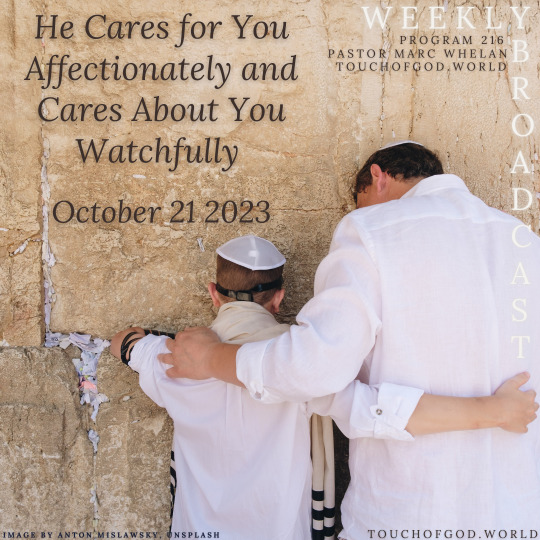
View On WordPress
#1 Peter 2:9-10#1 Peter 5:7#christ#Ephesians 1:17-23#father#god#Jesus#Matthew 11:28-30#yahweh#yeshua
0 notes
Text




drdttober day eleven - games/late night
#drdt#danganronpa despair time#drdttober#drdttober2023#drdttober 2023#j moreno#veronika grebenshchikova#david cheim#arei nageishi#whit young#teruko tawaki#xander matthews#I TECHNICALLY GIT THIS IN ON TIME#11:59 BABEYY!!!!#i drew the concept much earlier… but i forgot abt actually making it until 9:30#i really wanted to color it but i legit had 20 minutes left so i speed colored w like. 3 times#*tones#i may revisit this? i am not immune to insomnia au
32 notes
·
View notes
Text

“Keeping In Step with Christ” This 1-minute devotion explains why Christ told us to take His YOKE and 4 ways we can make sure we're doing it:
We always get out of step when we try to bear our own burdens, solve our own problems, and operate in our own power.
We need a yoke* that connects us with Christ so we can move in step with Him:
“Come to me, all you who are weary and burdened, and I will give you rest. Take my yoke upon you and learn from me, for I am gentle and humble in heart, and you will find rest for your souls. For my yoke is easy and my burden is light.” (Matthew 11:28-30).
Yoked to Christ, we walk where He walks:
1. Dwelling on His Word:
“Let the message of Christ dwell among you richly” (Colossians 3:16a).
2. Rejecting popular worldly philosophies:
“See to it that no one takes you captive through hollow and deceptive philosophy, which depends on human tradition and the elemental spiritual forces of this world rather than on Christ” (Colossians 2:8).
3. Following His purposes:
“For we are God’s handiwork, created in Christ Jesus to do good works, which God prepared in advance for us to do” (Ephesians 2:10).
4. Walking in His power and strength:
“I can do all this through him who gives me strength” (Philippians 4:13).
Jesus says, "Whoever serves me must follow me; and where I am, my servant also will be" (John 12:26).
Best of all, when we move in step with Christ, we find rest for our souls.
-----------------
*Yoke: "zygós – properly, a yoke; a wooden bar placed over the neck of a pair of animals so they can pull together; (figuratively) what unites (joins) two people to move (work) together as one."
For a deeper understanding of taking Christ's yoke:
•Which yoke
•Yoked but unburdened
•Learn from Him
•Jesus invites us to come take and learn
•Come
(All Bible verses in the NIV.)
#1 minute bible love notes#bible study#keeping in step with christ#matthew 11:28 30#colossians 3:16#colossians 2:8#ephesians 2:10#philippians 4:13#john 12:26#biblestudy#the bible#bible reading#bible verses#bible scriptures#the word of god#christian blog#bible#god#belief in god#faith in god#jesus#belief in jesus#faith in jesus#encouragement#keep the faith#make him known#christian life#christian living#christian faith#christian inspirational quotes
26 notes
·
View notes